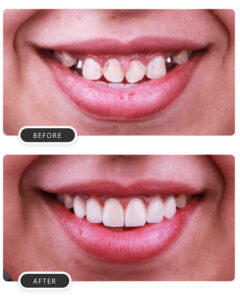
WHAT IS A FILLING?
A dental filling repairs the damage caused by tooth decay or a fracture. It restores the natural appearance of a decayed or previously filled tooth. Dental fillings today are tooth coloured, which blend very well to tooth enamel and are able to bond to the remaining tooth structure. Composite fillings(The best tooth coloured filling) are the most popular fillings to date. They are natural-looking and made from composite resin. Composite fillings begin soft and they are hand-shaped during the filling process. A blue light is then used to cure the composite to harden it. Composite fillings are very durable and bond well to tooth enamel.
WHAT HAPPENS IN A FILLING PROCEDURE?
Prior to any filling procedure, your dentist will talk to you about your options to determine which filling type would be best suited and how to plan for them.
During your appointment, local anaesthetic will be administered to the affected area to numb the tooth and surrounding structures. The decay will then be removed, usually using a dental drill. Once only strong and healthy tooth structure remains, the cavity is disinfected and dried before filling material is placed. The dentist will shape and cure the filling to harden it before checking your bite and ensuring it is comfortable.
AFTER THE FILLING PROCEDURE
It is advised not to eat or drink for 2–3 hours after a filling procedure due to the local anaesthetic. Once the local anaesthetic has worn off, you may experience some sensitivity in the area for a few days. For some people, it can take a couple of weeks for the filling to settle down.
If you experience any pain or if the filling does not feel right, please see your dentist as soon as possible.
HOW LONG DOES A FILLING LAST?
Depending on which type of filling you opt for, fillings can last more than 20 years. Fillings are placed under constant stress and movement from eating or even grinding, and this can cause fillings to wear away faster. When a filling is no longer in good condition, it can result in further decay, cracks or fractures. Therefore, it is important to visit your dentist regularly for oral hygiene maintenance to help extend the life of your fillings.
